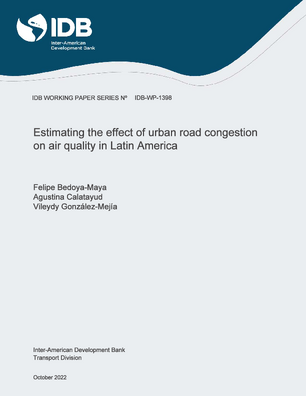Estimating the effect of urban road congestion on air quality in Latin America
Date
Oct 2022
Road congestion and air pollution are key challenges for quality of life in urban settings. This research leverages highly disaggregated crowdsourced data from Latin America to study the effect of road congestion on levels of carbon monoxide, nitrogen dioxide, and particulate matter in four of the most congested cities in developing countries: Bogota, Buenos Aires, Mexico City, and Santiago. Based on a panel data econometric approach with over 4.4 billion records from Waze and hourly data from 54 air monitoring stations for 2019, our two-stage least square model shows a cumulative increase of 0.6% in response to a 1% of road congestion on the three air pollutants. Moreover, we find a nonlinear relationship between road congestion and air quality and estimate the threshold above which the effect decays. This study provides evidence that supports public policies designed to make urban mobility more sustainable by implementing measures to reduce road congestion in developing contexts.




